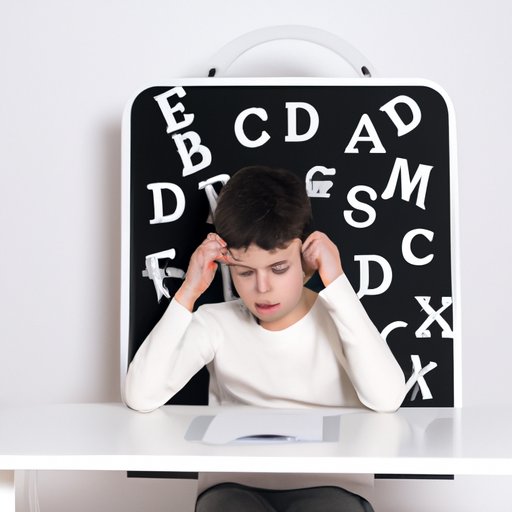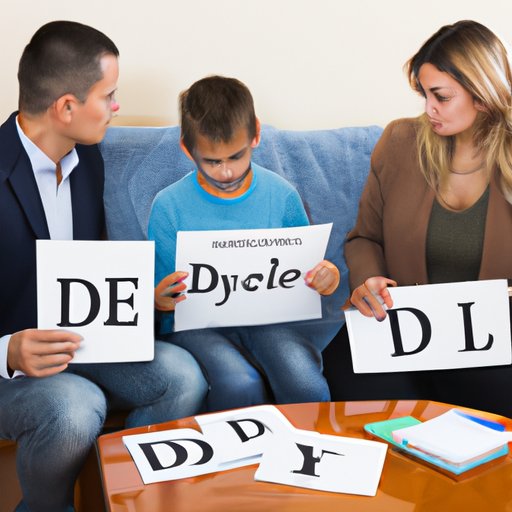
Introduction
Dyslexia is a learning disorder that affects a person’s ability to read, write, and spell. However, dyslexia is often misunderstood. Many people think that individuals with dyslexia just see letters and words backward, but this is not always the case. Dyslexia presents differently in different people and can range from mild to severe. In this article, we will explore dyslexia symptoms and how they can impact individuals of all ages. Whether you’re a parent, teacher, or someone who suspects they might have dyslexia, this guide is for you.
Understanding Dyslexia: Common Symptoms to Look Out For
Dyslexia affects a person’s ability to read and comprehend language. This can include difficulty with phonemic awareness, decoding words, and recognizing sight words. People with dyslexia may also have difficulty with writing and spelling. Other symptoms can include trouble with memory, organization, and time management.
In some cases, dyslexia can be genetic. If one or both parents have dyslexia, there is a higher chance that their children may also have it. However, dyslexia can also develop as a result of brain injury, illness, or environmental factors.
Dyslexia can manifest differently in different people. For example, some individuals may have difficulty with auditory processing or hearing sounds in words. Others may struggle with visual processing or processing the written word. It’s important to remember that dyslexia is not a one-size-fits-all disorder.

Decoding Dyslexia: Recognizing Symptoms in Children and Adults
While dyslexia can affect people of all ages, it’s often first recognized in children who are learning to read and write. Some common symptoms to look out for in children include difficulty with letter and sound recognition, slow reading speed, and poor spelling. Children with dyslexia may also have trouble with reading comprehension and may have trouble following instructions.
Symptoms of dyslexia in adults can be more subtle and may be mistaken for other conditions. For example, an adult with dyslexia may have trouble with time management and organization, or they may struggle with remembering names and numbers. They may also have difficulty with public speaking or be hesitant to read aloud in front of others.
Breaking Down Dyslexia: The Top Symptoms You Need to Know
Some of the top symptoms of dyslexia include difficulty with phonemic awareness or decoding words. This can result in slow and halting reading, as well as difficulty with spelling and writing. People with dyslexia may also have trouble rhyming or recognizing sight words.
These symptoms can impact reading fluency and comprehension, as well as overall academic and personal success. It’s important to recognize these symptoms early on and seek help if needed.
Some other signs of dyslexia include trouble remembering names, dates, and phone numbers, difficulty with sequencing or order, and trouble distinguishing left from right. These symptoms may not be as well-known as the more common ones, but they can still have a significant impact on daily life.
Dyslexia Symptoms: Spotting the Signs and Seeking Help
Spotting the signs of dyslexia is important because early intervention can make a big difference. Some common diagnostic tests for dyslexia include standardized reading tests, as well as tests of phonemic awareness and oral language skills.
If a person is diagnosed with dyslexia, there are a variety of treatment and support options available. These may include specialized reading programs, assistive technologies, and accommodations such as extra time on exams or audio books. It’s important to work closely with a qualified professional to determine the best course of action for each individual.
The Hidden Signs of Dyslexia: Understanding Symptoms and Solutions
It’s also important to be aware of the lesser-known symptoms of dyslexia, such as trouble with time management and organization. Children and adults with dyslexia may benefit from additional support in these areas, such as using calendars or task lists to help with scheduling.
Assistive technologies such as text-to-speech software or speech recognition software can also be helpful for individuals with dyslexia. These tools can help to reduce reading and writing demands and make it easier to communicate effectively.
Navigating Dyslexia: Identifying Symptoms and Finding Support
If you or someone you know is struggling with dyslexia symptoms, it’s important to seek help. Parents can work with teachers to determine what support may be needed in the classroom, and adults can seek out professional assessment and treatment options.
There are also numerous resources available to support individuals with dyslexia, including tutoring programs and advocacy groups. By working together and seeking out support, individuals with dyslexia can thrive and succeed in all areas of life.
Unpacking Dyslexia: A Guide to Recognizing Symptoms and Treatment Options
Dyslexia is a complex disorder that affects millions of people worldwide. But with recognition and support, individuals with dyslexia can overcome their challenges and achieve their goals. From understanding the common symptoms of dyslexia to navigating treatment and support options, this guide has provided a comprehensive overview of this important topic. If you suspect that you or someone you know may have dyslexia, don’t hesitate to seek out professional help. With proper diagnosis and support, anything is possible.
Conclusion
Dyslexia can present differently in different people and can impact individuals of all ages. Whether you’re a child, teenager, or adult, recognizing the symptoms of dyslexia is essential for success. By seeking out support and assistance, individuals with dyslexia can overcome their challenges and thrive in all areas of life. Together, we can increase awareness of dyslexia and provide the support that is needed to help everyone achieve their full potential.




